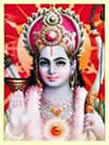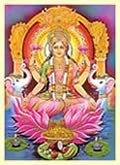|
 Diwali
or Deepavali means an array of lamps (Deep = Lamp,
Vali =Array). This is one of the major festivals in the Hindu
calendar. It occurs in October/November, and is spread over
four days. Dhanteras (Dhanatrayodashi) is the first day or
rather the eve of the day on which the festival begins. Narkachaturdashi
which is also known as Kalichoudas or Bali Pratipada is the
second day. Laxmi Pujan and New year (Padava) normally occur
(depending on the Hindu calendar) simultaneously on the third
day and Bhai-beej (Bhaiya-duj) is the last day. Diwali
or Deepavali means an array of lamps (Deep = Lamp,
Vali =Array). This is one of the major festivals in the Hindu
calendar. It occurs in October/November, and is spread over
four days. Dhanteras (Dhanatrayodashi) is the first day or
rather the eve of the day on which the festival begins. Narkachaturdashi
which is also known as Kalichoudas or Bali Pratipada is the
second day. Laxmi Pujan and New year (Padava) normally occur
(depending on the Hindu calendar) simultaneously on the third
day and Bhai-beej (Bhaiya-duj) is the last day.
This is a very popular festival in many parts of India. The
celebration of Diwali is marked by the lighting of innumerable
lamps in every courtyard and the bursting of crackers. Sweetmeats,
new clothes etc., are made as in other festivals. The time
for rejoicing is mainly early morning and late night. These
hours of darkness bordering the waking hours are preferred
as lights and crackers are the highlights of the festivities
and these need darkness to have their illuminating effect.
Hence people rise early and go to sleep late.
Mythologies associated with Deepavali-
 Ram's
return from exile- According to mythology, the celebration
of Diwali is closely bound up with one of India's classic
epic, the Ramayan. Lord Ram is said to have reigned for a
long time during which the people were happy and contented.
Ramrajya (the reign of Ram) has come to connote
an era of peace and prosperity. Ram's
return from exile- According to mythology, the celebration
of Diwali is closely bound up with one of India's classic
epic, the Ramayan. Lord Ram is said to have reigned for a
long time during which the people were happy and contented.
Ramrajya (the reign of Ram) has come to connote
an era of peace and prosperity.
The festival of Diwali, we were told, is celebrated to commemorate
Ram's return from exile. Ramnavami, another festival is celebrated
as the birthday of Lord Ram, sometime in March.
Deepavali - A Harvest Festival
Worship of the Goddess of Wealth (Laxmi), observance of the
New Year and performance of Aarti (a ritual that combines
worship and adoration) are a part of the festival. On the
second day of Deepavaali (Kali Choudas) a ritual that is strongly
suggestive of the origin of Deepavaali as an harvest festival
is performed. On this day delicacies are prepared from pounded
semi-cooked rice (called Poha or Pauva). This rice is taken
from the fresh harvest available at that time. This custom
is prevalent both in rural and urban areas especially in Western
India. In rural areas, Diwali signifies only this aspect.
The reason being the fact that Diwali which is celebrated
sometime in October/November co-incides with the end of a
harvesting season, known as the Kharif season when the fresh
crop of rice is available.
Laxmi Pujan - A Veneration of the Prosperity at the end
of an Harvest
 As
mentioned earlier in this article, the harvest was an important
occasion for rejoicing in all agrarian societies. Diwali which
occurs at the end of a cropping season has along with the
above custom, a few others that re-inforce the hypothesis
of it having originated as a harvest. Every harvest normally
spelt prosperity. Veneration of this prosperity must have
been at the origin of the worship of the Goddess of wealth
(Laxmi). For Farmers, a Festival marking the end of
one Harvest and the beginning of another, was a festival heralding
the beginning of a New Year. As
mentioned earlier in this article, the harvest was an important
occasion for rejoicing in all agrarian societies. Diwali which
occurs at the end of a cropping season has along with the
above custom, a few others that re-inforce the hypothesis
of it having originated as a harvest. Every harvest normally
spelt prosperity. Veneration of this prosperity must have
been at the origin of the worship of the Goddess of wealth
(Laxmi). For Farmers, a Festival marking the end of
one Harvest and the beginning of another, was a festival heralding
the beginning of a New Year.
The association of the New Year (termed) Paadva or Paadvo,
with Diwali also substantiates the harvest festival theory.
The end of one harvest and beginning of another meant the
end of one cycle of activity and the beginning of another,
as all activities in an agrarian economy must have been linked-up
largely with agriculture. Hence it was quite natural to look
upon a festival that was observed at the end of one harvest
season and the beginning of a new one, as a festival heralding
the beginning of a new year. Gudi Paadva which is also looked
upon as a new year in some parts of India (Maharashtra, Karnataka,
Andhra) also occurs at the end of another croppping season
(the Rabi season) and coincides with a harvest. This festival
comes around March. And finally both the occasions on which
the new year is observed are called Paadva.
The word Paadva is etymologically quite close to the Sanskrit
word for crop which is 'Pradurbhu'. Paadva might be a corrupted
form of the original word for "crop" which
was used to term the new year festival. The inference that
can be drawn from the above clues is that Diwali as a festival
owes its origin to the reaping of a harvest.A Harvest presented
a logical occasion for rejoicing and merriment.
by
Sudheer Birodkar
© 2021 VandeMataram.com
|




